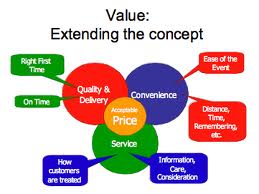Price vs Value
As business owners, customers, and people, when we buy something, we like to think we are getting the same amount of value for the money we are spending. This is true if we spend $50, $500, or $5,000. We don’t care as much about the dollar amount as we care about the value. If we were only concerned about the price, we would all stay at $59 per night hotels, and obviously that doesn’t always happen. In fact, we will spend $100, $150, or $250 for a hotel to have a high-quality experience. After all, we don’t just want to sleep anywhere, right?
The same can be said for just about everything we buy. As a business, we must provide value relative to the cost of our product or service. This value is what would incentivize people to purchase from our business rather than another. Most of the time, it doesn’t matter if the cost is significantly higher than competitors because people know they are paying for the value. A customer’s reasoning behind a purchase is not always logical and can be based on emotions such as pride, vanity, competitiveness, fear and pleasure.
What elements of your business are appealing to customers and stimulate their desire to buy your product or service? Knowing this and working to increase awareness to one or more of these elements could increase the attraction, discussion, sharing and purchase.
At Efficience, we build custom websites for people that are looking to work with our experienced creative director, Tori Rose, to create a unique, visually appealing website that fits their specific brand. Other options are available for people to purchase an out-of-the-box website at a relatively lower cost. Sometimes, though, this option limits aesthetic qualities and functionality, but it still provides basic web presence. Some customers only value web presence, while others value an attractive and compelling site that resonates with specific emotions they want to connect with.
Is your company focusing more on value or price? How are your products or services providing value to your customers that is worth the price?
 So what does value mean to you? How do you know when you’re providing value to your customers? I would say that increasing business is a good indicator. When your customers are waiting in line for your product or service, you are adding extreme value (think
So what does value mean to you? How do you know when you’re providing value to your customers? I would say that increasing business is a good indicator. When your customers are waiting in line for your product or service, you are adding extreme value (think 